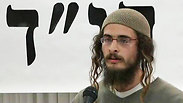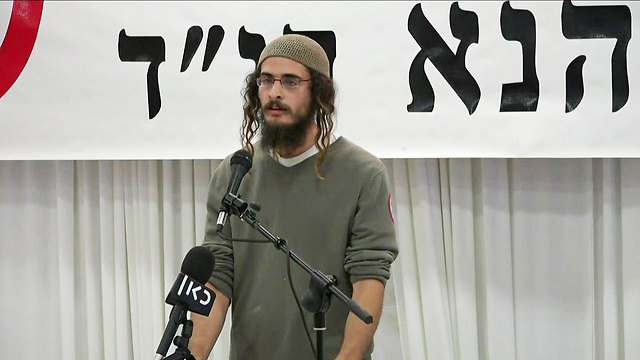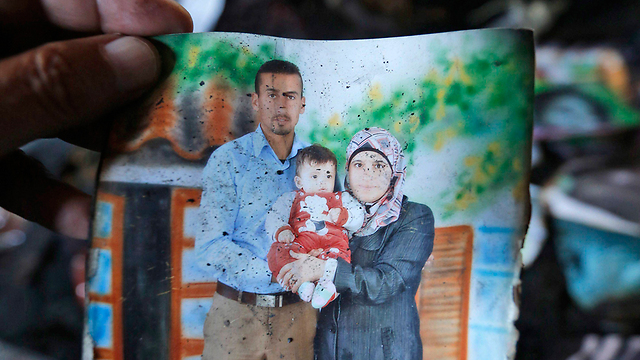
The new era of Jewish terror
Op-ed: There is a growing acceptance and support of extreme right-wing views demonstrated by support for the defendants in the Duma terror trials. The practical objectives of Jewish rebel groups have turned into attempts to overthrow the government and start religious wars in order to establish a state governed by radical Jewish Law.
During last week’s court hearing of the Duma murder affair—the "flagship case" in the authorities' struggle to eradicate Jewish terrorism, a group of demonstrators who came to support the two defendants waited outside the courtroom with banners that read "the people are with you."
It is clear that a handful of fringe elements who either perpetrate or support Jewish terrorism are an exception to the rule, but it is clear, as that banner claimed, that the tolerance for radical views in the Israeli public is growing.
The support the defendants in the Duma case receive illustrates the rift in the Israeli society between those who believe that “terrorism is terrorism” regardless of the identity of the perpetrators, and those who view Jewish terrorism as legitimate acts of revenge in response to violent acts of Palestinian in a long term conflict.
The violence attributed to Jewish terror from the early 1980s to the mid-1990s was characterized by retaliation to Palestinian terror acts or the evacuation of settlements in the West Bank. The pattern of Jewish terror has not changed since then, but their political motives have. Their ideology has become more extreme and it has wrapped itself in an anti-Zionist anarchist blanket.
Unlike in the past, Jewish terror is no longer guided by utilitarian motives such as deterring the government from evacuating settlements, but rather by a desire to undermine the stability of the state, which would result in a government coup and the establishment of a state governed by the Halacha (Jewish law).
This ideology has managed to gain a foothold among the young people known as the "price tag" activists or “Hilltop Youth” and has seen the rise of organizations such as "Giv'onim" and "Bat Ayin Underground".
The most extreme group that emerged as part of the new Jewish terror is Kvutzat Ha'mered organization (the rebel group)—the members of which held the banner in support of the defendants during the Duma trial.
The organization was founded in late 2013 and advocates violence against Palestinians in order to instigate a religious war.
The war, when it breaks out, will help them topple the ruling government—which they perceive as being soft on the Arabs.
The organization, which consists only of a few dozen activists, identifies mostly with the author of the "Revolt," Meir Ettinger—Rabbi Meir Kahane’s grandson, who is on the most wanted list of the Shin Bet Jewish division.
The organization is inspired by the letters of Ettinger and of rabbis who identify with this phenomenon. For example, the booklet "Baruch the Man," which is a founding document for thr Hilltop Youth, praises Baruch Goldstein, who committed the massacre of the worshipers in the Cave of Machpelah in 1994.
This booklet was written by Rabbi Yitzchak Ginsburgh, whose book The Order of the Hour asserts that the Israeli Left is responsible for the murder of dozens of Jews and that "Arabs have no right to exist in the land of Israel."
Another seminal book is Torat Hamelech, written by rabbis Yitzhak Shapira and Yosef Elitzur, in which they state that the killing of non-Jews should be permitted.
Any reasonable person understands that the fringe elements that carry out terror acts should be condemned and denounced, and no less than those who support and encourage them.
It is safe to assume that it is difficult for the general public to view Jews, their brethren, as murderers. How can these Jews be referred to as murderers during a conflict in which there are civilian casualties on both sides?
The answer to this question is important and is integrated into other aspects, during a time when a war on terrorism is parallel to the fight against those who seek to delegitimize Israel and use to their advantage incidents of this nature.
Terrorism, due to being a strategy usually chosen by the weaker side in an asymmetrical conflict, naturally poses a moral dilemma for the stronger side, especially in democratic countries.
Therefore, this question is only one of several with which Israeli society is dealing in its fight against terrorism on various fronts, and most of them come down to the fundamental question regarding the identity of the state.
The Israeli public must ask itself whether it wants to be the kind of society that cheers on the tragedies of its enemies, or if it will we be a moral compass for universal rules of conduct, both to ourselves and to our enemies?

Meir Ettinger
Photo: Gal Arbel
מומלצים

















